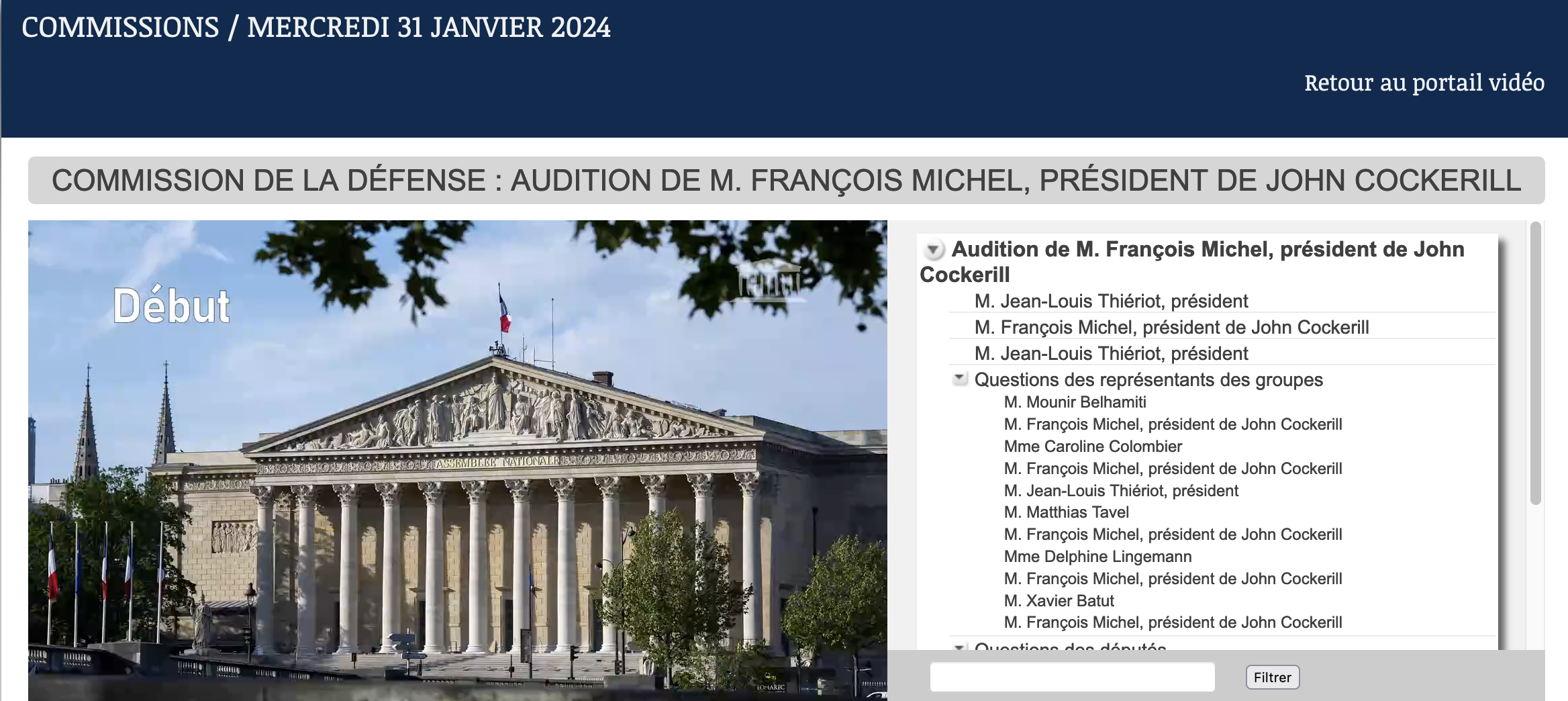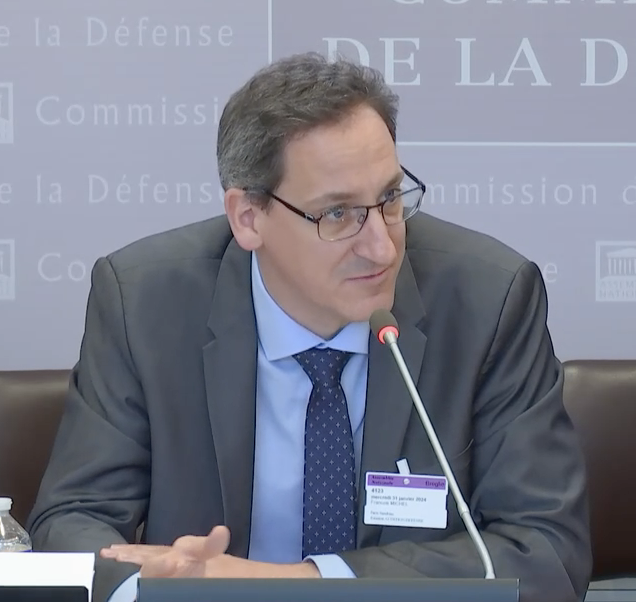By Pierre Tran
Paris – It was thanks to information shared on a social media link of the Association of Defense Journalists, a press club, this correspondent suited up to attend the Jan. 31 French parliamentary hearing of François Michel, chairman of John Cockerill, a Belgian company which builds armed turrets for armored vehicles.
The hearing was timely as Cockerill is in exclusive talks to acquire Arquus, a French builder of light and medium armored vehicles.
Volvo, a Swedish truck maker, is the parent company of Arquus, seen as struggling due to weak foreign sales.
That prospective cross-border acquisition is reported to be worth some €300 million ($324 million), with the final price depending on an “earn out” clause pegged to the performance of Arquus over 18-24 months after the deal closes.
While it was possible to click on the website of the lower house National Assembly and watch the hearing remotely, it seemed worthwhile to cycle on a chilly winter’s morning to report on the defense committee, led on this occasion by the vice chair, Jean-Louis Thiériot.
The hearing was open to the press, and French media did report on Michel’s presentation, but this correspondent was the only one to turn up for the hearing.
The defense committee gathered in a freshly refurbished building in the elegant Haussmannian style, tucked away just round the corner from the imposing National Assembly building and near Brienne House, the offices of the armed forces minister.
The reception staff were diligent and helpful in facilitating entry to the secure building, and a parliamentary advisor escorted the correspondent to a well-attended committee room, which was transmitted live on the parliamentary video link.
It was helpful just to be in the room, as French members of parliament quizzed a captain of foreign industry looking to acquire a company employing their constituents.
John Cockerill, the British founder of the Belgian company, has been much in the press, not just in France but also in Belgium.
In Brussels, one of the four bronze statues of workers around the central figure of Cockerill, a pioneer of the Belgian steel industry in the 19th century, was toppled last week by angry farmer protesters calling for better conditions, Brussels Times and Belga agency reported. The Belgian prime minister, Alexander De Croo, criticized the act of vandalism when he visited Feb. 1 the damaged national monument to Cockerill, just outside the European Parliament.
Saint Nazaire Jobs
The protocol is the committee chair opens the hearing, and introduces the guest speaker, who gives a timed presentation. The chair then goes around the room by political party, with the parliamentarian making prepared remarks and asking questions, to which the guest replies.
Then the hearing is thrown open to other parliamentarians, with the speaker replying.
Loss of jobs is a key issue in mergers and acquisitions in France, and the parliamentarians’ questions made clear their concerns for constituents, particularly those around Saint Nazaire, western France, where Arquus has a factory.
Cockerill’s Michel spoke quickly, cramming within an allotted two minutes a 200-year back story of an Anglo-Dutch company, founded by John Cockerill, building cannons and equipment for the steel and rail industry, and promoting the corporate strategy of cutting costs by selling large fleets of vehicles of simple, modular design with integrated gun turrets and chassis, with an anti-drone capability, while selling into emerging markets expected to switch away from Russian suppliers.
Michel, who said he was a French national who started out at Chantiers de l’Atlantique, a Saint Nazaire shipbuilder, sought to persuade parliamentarians that the acquisition of Arquus would allow large foreign sales, backed by technology transfer and local assembly by foreign partners, while maintaining jobs and the present number of factories in France, and ruling out a management reshuffle.
Michel referred vaguely to discussions with the Belgian and French governments on “protective measures” on assets, with the results of the talks in the next few months.
The vice chair, Thiériot, had referred in his opening remarks to the sensitive nature of the financial terms of the bid for Arquus.
Matthias Tavel, a member of parliament for Saint Nazaire, called on Michel to give “firm commitments” for long term French jobs, working with the KNDS Franco-German joint venture, and maintaining Arquus’s service business at Saint Nazaire while pursuing production overseas.
Michel said there was an “extremely serious” commitment to maintain jobs in France and Belgium, and there would be cooperation with KNDS and other companies, but those would not undermine the work with Arquus. Foreign deals, agreed with state or industrial partners, helped maintain Cockerill’s French and Belgian jobs over the last 20 years, he said.
The priority was to maintain existing sites, he said, with exports seen as supporting work in the home market.
Technology transfer and local assembly with foreign partners were part of the deal, he said, as could be seen in export sales of aeronautic and land equipment. In the balance, the priority was to maintain jobs in the home market, he said, adding there was a firm commitment “never to touch the Saint Nazaire site.”
The planned acquisition would develop the Saint Nazaire site, he said, and long-term commitments on Arquus jobs depended on exports. There were no plans to halve the number of Arquus jobs, he added.
Michel’s remarks were particularly striking and “reassuring,” a source close to Arquus said after the hearing.
Nexter is a unit of KNDS, a Franco-German company 50/50 held by the French state and the German Bode-Wegmann family. France holds a golden share in Nexter, for protection of sensitive technology and national sovereignty.
Cockerill is privately owned by Bernard Serin, a French national, who acquired the company in 2002.
Parliamentarians Reach Out
Mounir Belhamiti, the member of parliament from the Loire-Atlantique constituency, said he sent a “friendly greeting” to the workers at the Saint-Nazaire factory, who were doing good work to equip the French army.
Michel, replying to Anne Genetet, who drew on a speech by president Emmanuel Macron on the French war economy, said an armored vehicle turret now took a year to build compared to two years before the war in Ukraine. That was unsatisfactory, but a big improvement, he said.
The military requirements of emerging markets were four or five times larger than the Belgian and French forces combined, he said, and it only took a few of those large volume contracts to stay in business. It was unsustainable without those big foreign deals, he said.
Christophe Blanchet said he thought of two companies in his constituency – ACGB, which builds fuel tanks, and Renault Trucks at Blainville, northern France, and pointed up the importance of subcontractors. Blanchet’s constituency is in Calvados, northwestern France.
Michel pointed up two key points in his presentation to the committee.
The first was there was a large “strategic complementarity” with Nexter, which had expertise in artillery, heavy armored vehicles, and 8×8 vehicles, while the planned acquisition worked on light and standardized vehicles for foreign markets, he said.
The second point was Arquus, he said, had modernized its plant and increased competitiveness with support from Volvo, but the French unit had not been able to pursue exports. The acquisition offered more “synergy” and greater volume, not laying off workers or managers, he said, and that Arquus was a great industrial asset.
Such a deal could not be considered, he said, if there were not a high level of confidence between the Belgian and French governments, defense ministers, and the armed forces.
Arquus, along with Nexter and Thales, is one of the prime contractors on the French army Scorpion modernization program.
The three companies delivered through a temporary joint venture 123 Griffon armored multirole vehicles and 22 Jaguar armored reconnaissance and combat vehicles to the Direction Générale de l’Armement procurement office in 2023, as contracted, Nexter said in a Feb. 5 statement.
There was first shipment on June 16 an artillery observation version of the Griffon, which included a retractable opto-electronic observation mast for surveillance, telemetry, and laser designation for targeting and guiding artillery.
Cockerill, previously trading under the name of Cockerill Maintenance & Ingénerie (CMI) made an offer for Arquus in a competition launched in 2016. KNDS made a rival offer, and Volvo cancelled the tender in 2017 as the bids fell short of the €500 million-€700 million then seen to be fair value for the French military business, led by Renault Trucks Defense. The business unit was rebranded Arquus, the Latin term for bow.
Volvo has taken a financial hit of some 900 million Swedish crown on the operating profit line due to the planned sale of Arquus, the Swedish company said Jan. 15. Arquus accounted for 1 percent of Volvo’s 2022 sales, compared to 1.5 percent in 2016.
See also,
Strengthening Franco-Belgian Cooperation: The Cockerill Acquisition of Arquus

Here is the video link on the defense committee hearing:


